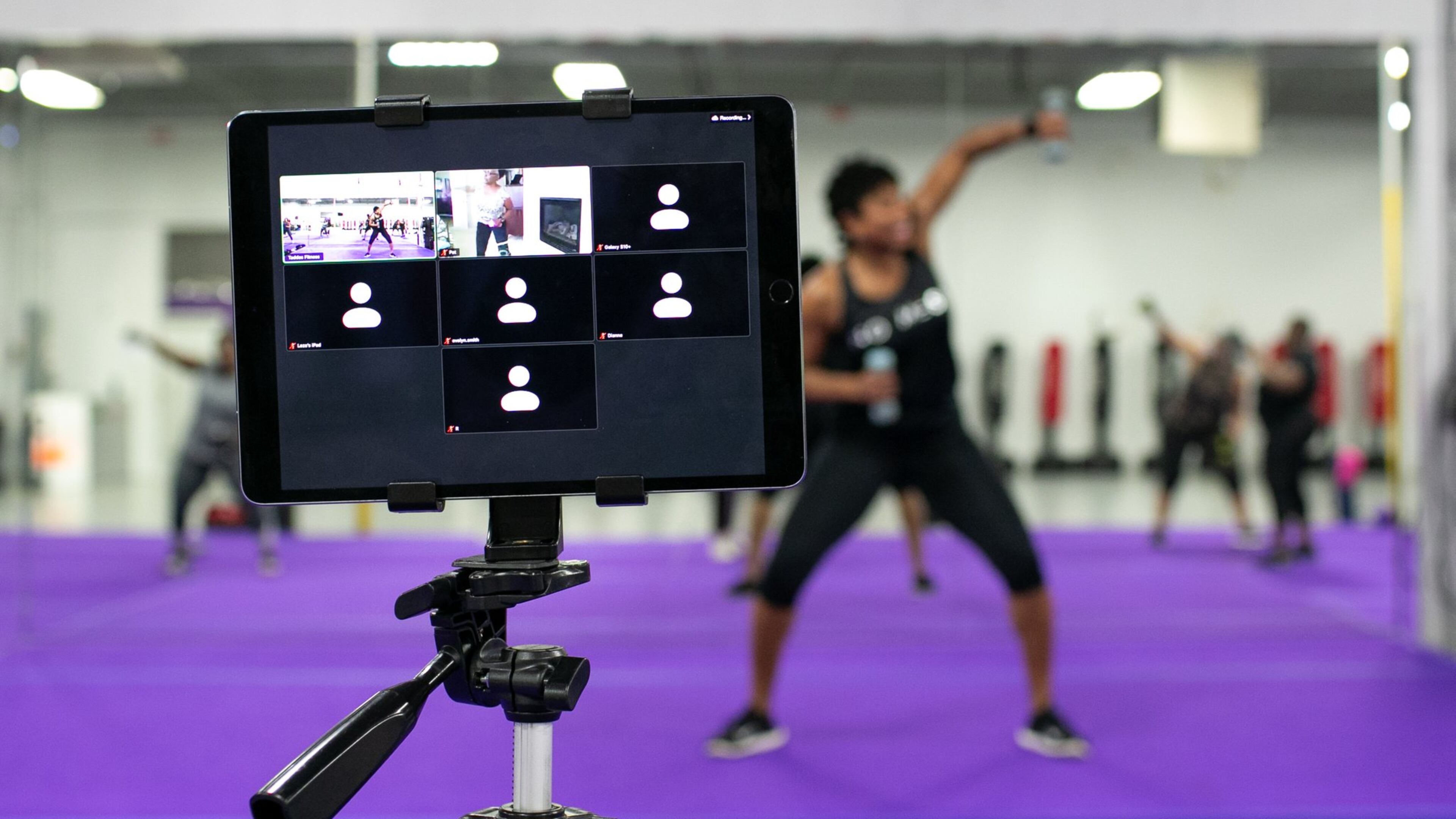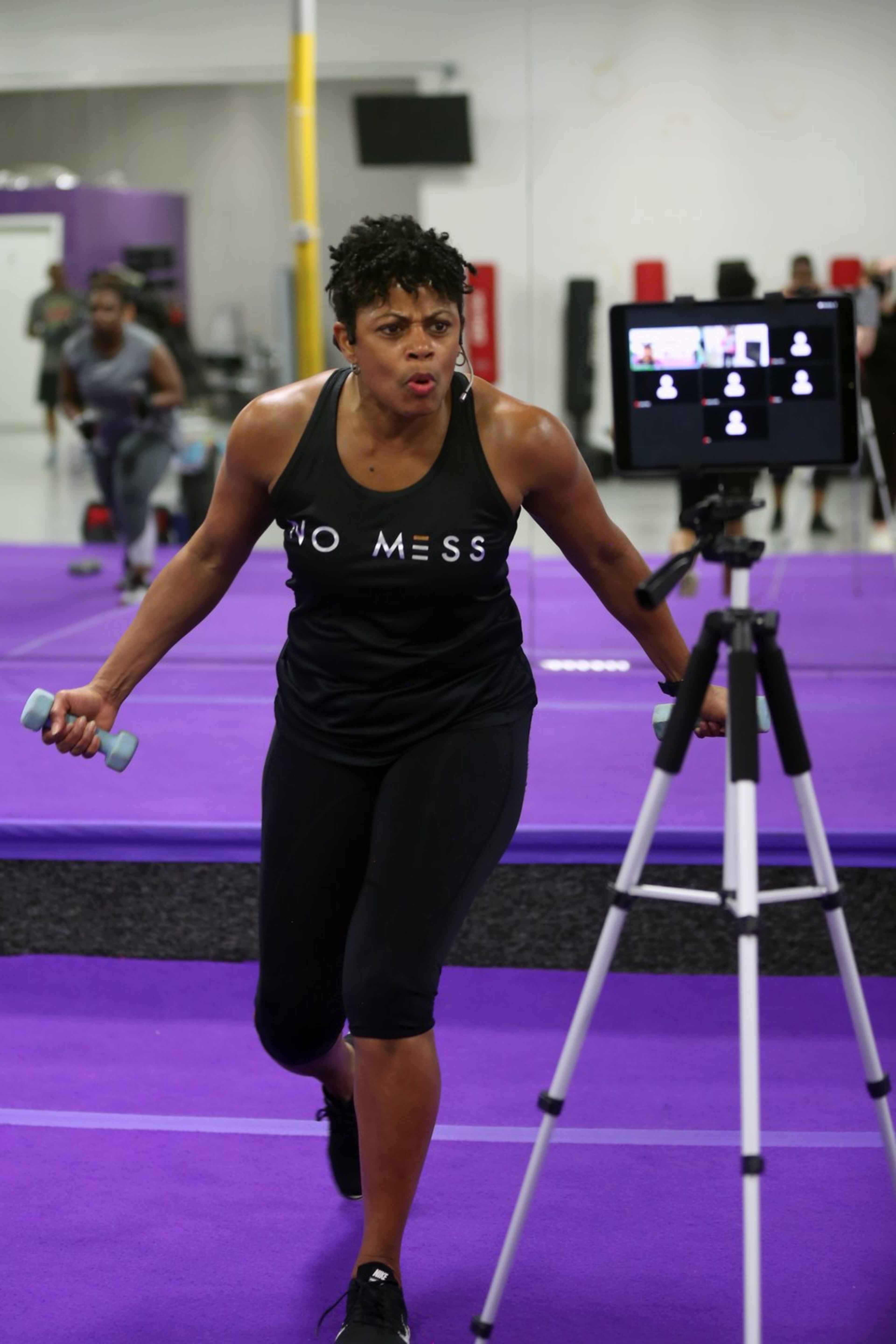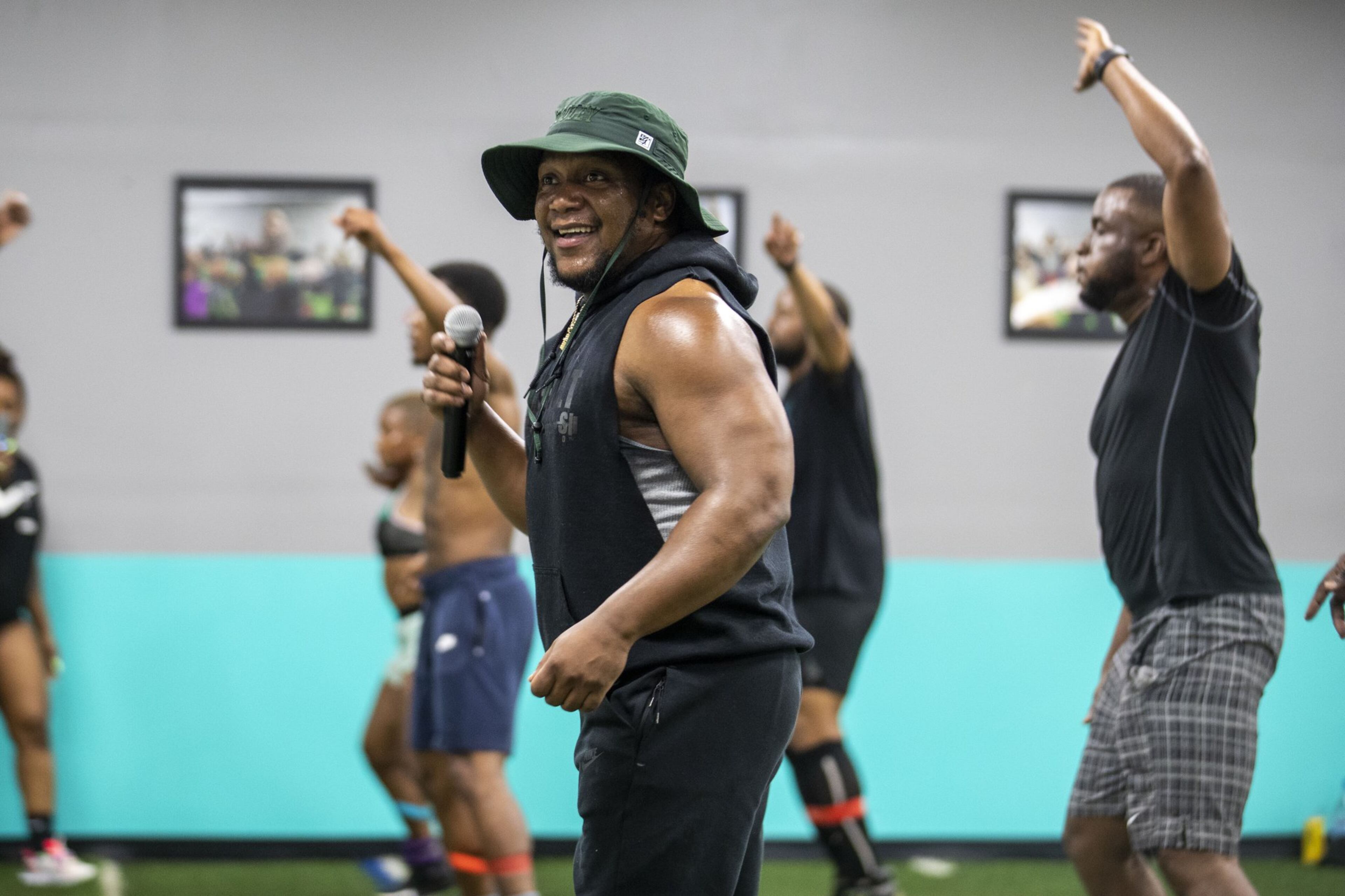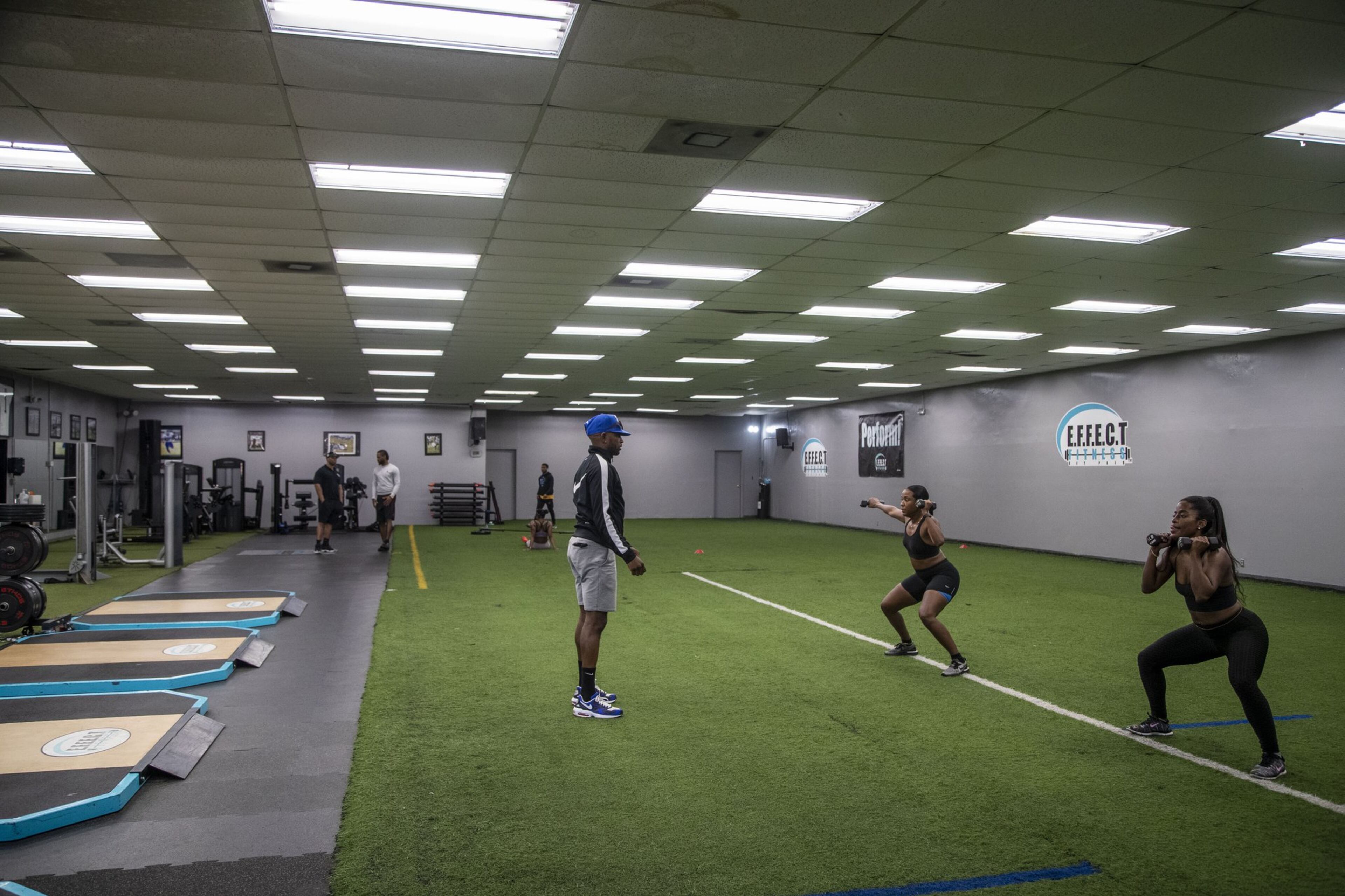Miss the gym? Virtual workouts are an option

As one of the city’s top fitness experts who has trained everyone from Atlanta-based professional athletes to celebrities, such as Usher and Keri Hilson, personal trainer Rahman Grayson never considered he’d be in this position. When the COVID-19 pandemic struck the nation in early spring, Grayson (who is better known by his moniker Mr. Shut Up and Train) closed his gym per state instructions and sheltered-in-place to do his part to stop the spread of the virus. Even as government restrictions relax, he admits the pandemic has been a lingering disruptor to his normal life. But ever the optimist, Grayson does see a silver lining.
“I think this quarantine has forced a lot of people to get their bodies moving. People are doing movements that they would not have otherwise done,” Grayson says about the newfound interest to exercise, get out of the house and try different activities. “When you get in a routine, you get so stagnant. This forced change of routine has allowed people to probably work on some things that they haven’t worked on otherwise.”
And new research suggests, Grayson is likely on to something. Roughly 28 percent of Georgians are exercising more since the pandemic, according to a recent Sharecare survey, which polled more than 5,000 state residents as part of their nationwide study. And surprisingly nearly half of those surveyed were able to maintain their normal activity levels, despite the pandemic challenges.
“Exercise is crucial under normal conditions, however, it is critical to your physical health and mental health during the COVID-19 pandemic,” advises LaTasha “Tadda” Lewis, a registered nurse, certified trainer and owner of Tadda’s Fitness Center, an all-inclusive fitness and wellness facility located in Decatur. “Exercising can help to reduce stress, prevent weight gain and other weight-related illnesses —plus it helps to boost your immune system. If your immune system is compromised, you’re at more risk of the virus.”

But if you see yourself in the group of Georgians struggling to find a path to fitness, how do you stay active—particularly in the midst of a pandemic? If you’re not quite comfortable going back to your gym, these local Atlanta fitness professionals are sharing some smart suggestions on how to work out virtually.
Find a live virtual fitness class
Prized for its high-energy environment and heavy camaraderie, the Effect Fitness boot camps are known to draw crowds of 150 to 200 exercisers per in-studio session. Obviously large crowds aren’t back in the picture, yet. So, since the start of quarantine, Effect Fitness founder Keundric “Dooley” Loucious started streaming his boot camps for free on Effect Fitness’s Instagram Live and Facebook Live.
To mimic their normal class feel, multiple staffers exercise on camera along with the viewers. Even without the physical closeness, Loucious says the contagious energy still translates as participants who join are able to exercise within an online community, in which numbers have reached to more than 30,000 streamers.

“We have viewers in Germany and people in Dubai, in South Georgia, California and Louisiana,” he states. “When you are working out in a group with that energy, it is able to carry you past where you would normally be able to go.”
Even when social-distancing ends, Loucious vows he’ll still continue the free virtual classes because of how much they were embraced. Plus, they serve as a convenient way to train for the everyday person.
“We wanted to be practical. One of the classes we do is called Bricks; it’s literally a $2 cinder block,” he says about this virtual class, in which participants utilize a cinder block or stool as an aerobics step. “But these are things that can be done without weights and without equipment. You don’t need anything. Just do the movement, and I promise you a good burn.”
Seek out private virtual training communities
“Fitness is hard to stay dedicated to under normal circumstances, but when you add a pandemic to the mix, I have heard a lot of excuses,” offers Lewis.
To help her clients adjust to the change and new challenges, Lewis decided to take her Tadda’s Fitness Center classes online to a private Facebook group (which welcomes new members with registration and extends free membership to health care workers).

“In our private Facebook page, we help clients stay engaged by giving them helpful tips on nutrition and fitness, help to hold them accountable through this pandemic and provide emotional support as well as a place they can have open communication and ask questions about the COVID-19,” she says. “We also started virtual training in which we do live sessions daily, and clients that cannot make the live sessions can do the workout at their leisure.”
Forget one-size-fits-all; tailor digital workout plans
“I’m no stranger to online workouts. For the last 10 years, I’ve held my virtual fitness challenges, which have reached over 100,000 people in more than 50 countries worldwide,” says Grayson.
But now he says his virtual offerings have evolved to take into account individual goals and abilities to offer personalized virtual instruction that sort of “meets you where you are.”
“From a business owner and trainer perspective, I think the quarantine forced us to work on our communication—and we all know that communication is one of the most important things in any business,” he offers. “This has forced us to look at how we interact with clients, about client needs and client goals— just being able to help clients find different tools to stay accountable.”
To serve his clients better through quarantine, he hastened the production of his new fitness app. Together from their home gym, he and his wife Camille Grayson filmed 40 workouts and 400 individual exercises for his app. So, Grayson says his clients and followers now have multiple avenues to pursue exercise: through his personalized app, customized online training plans, virtual training sessions, social media channels (where he posts three free workouts a week) and his newsletter (which emails out two free workouts a week).
Use social media to find inspiration to get active in other ways
Mixed martial arts coach and fitness trainer Terry Kim fully recognizes that motivation can easily wane without in-person coaching and accountability (plus, some workouts like Brazilian Jiu-Jitsu are just harder to learn virtually). But for those not quite ready to return to a gym and not as likely to commit to a virtual option, he stresses the importance of just doing something.
“You don’t want to let COVID-19 turn into the ‘COVID 10,’ ‘15’ or ‘20,’” Kim jokes about the risk of an unwanted weight gain during the pandemic. “If virtual training works for you, that’s great, but I know a lot of clients who lack the discipline needed to keep them honest and active without the human environment.”
» RELATED: ‘Work in’ with these virtual exercises from Alpharetta fitness studios
His solution? Find an active hobby that you enjoy. Or, he suggests using the “fear of missing out” environment of social media to get inspired by what others are doing.
“I am a firm believer in leading by example, so I use my Instagram to demonstrate fun ways to exercise. I’ve encouraged people to begin gardening, to go on hikes and to find other ways to stay active,” Kim says. “If most people found push-ups or running fun, they’d already be doing it. By finding active hobbies, you are more likely to enjoy the labor or exercise.”
Search for online activities that involve your children
“Personally, for my family, we had to switch it up, and we’ve switched it up for the better,” confesses Grayson, who like many other Georgia parents found himself taking on the role of homeschool teacher and gym teacher when the schools closed. “We’ve adopted some things that we will continue to do even after the quarantine.”
Grayson strongly encourages family workouts, which could consist of a family walk, throwing a football, scavenger hunts and timed challenges, where kids race to complete a set of fun physical tasks and exercises.
“It’s super important to keep the kids active,” he states, admitting he even has to police the screen time in his household. “You can tell them one thing, but they are going to know what they see. If they see you working out, they will want to join in. They are curious.”
The year has certainly been challenging in more ways than one. Sometimes, life gets crazy and getting in a workout just doesn’t (for lack of better terms) work out. But always seeking the optimistic viewpoint, Grayson believes you shouldn’t focus on the challenges of the pandemic but rather the new possibilities that have resulted from it.
“It’s been the best time ever to stay in shape,” he says, “because you have so many options.”
Involve your circle for virtual accountability
Though not a personal trainer, Joy McCall decided to create her own virtual workout community as a way to keep herself and her friends accountable to exercise. She started it in 2017, about a year after the birth of her third child when she struggled to find consistency and motivation within her increasingly hectic schedule.
“I was doing the typical ‘trying to get back to working out’ and failing repeatedly,” McCall says. “I knew I simply wasn’t going to succeed in exercising regularly if I wasn’t doing it with other people in some way. I assumed many other people felt the same, so I put the idea of a virtual, exercise accountability group in a mom’s chat group and got my first 15 to 20 members.”
» RELATED: Amid coronavirus, Atlanta Beltline announces free online workouts
Today, it’s blossomed into a Group Me chat, in which membership has fluctuated up to more than 60 women. In her virtual accountability group, participants don’t have to stick to any type of exercise; they just have to track five days of exercise, which can include at least 30 minutes of any physical activity or 10,000 daily steps. Then, she asks each person to posts proof of their exercises with a picture or a screenshot of their fitness tracker.
“My role is to cheer people on, keep track of their five weekly workouts and check in when ladies miss days,” she says. “Everyone has the same purpose and is in it together, so it has really thrived through quarantine.”

